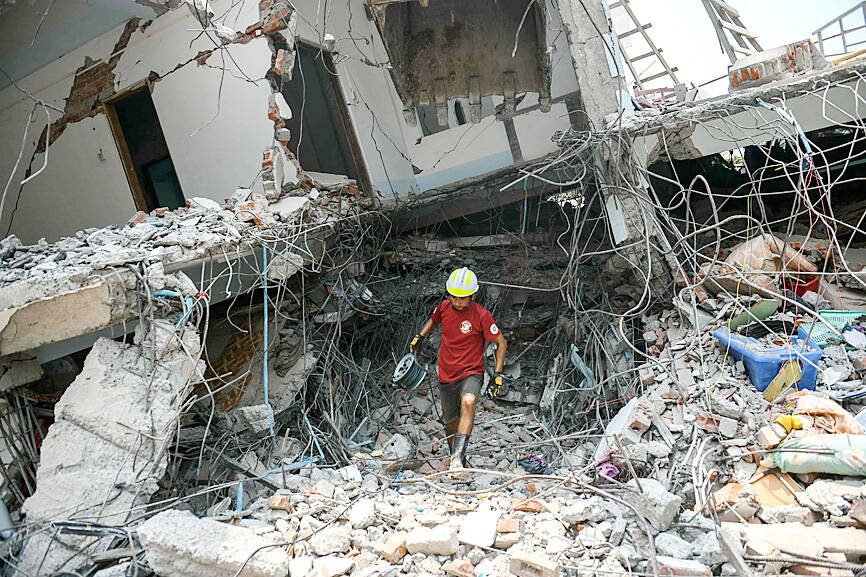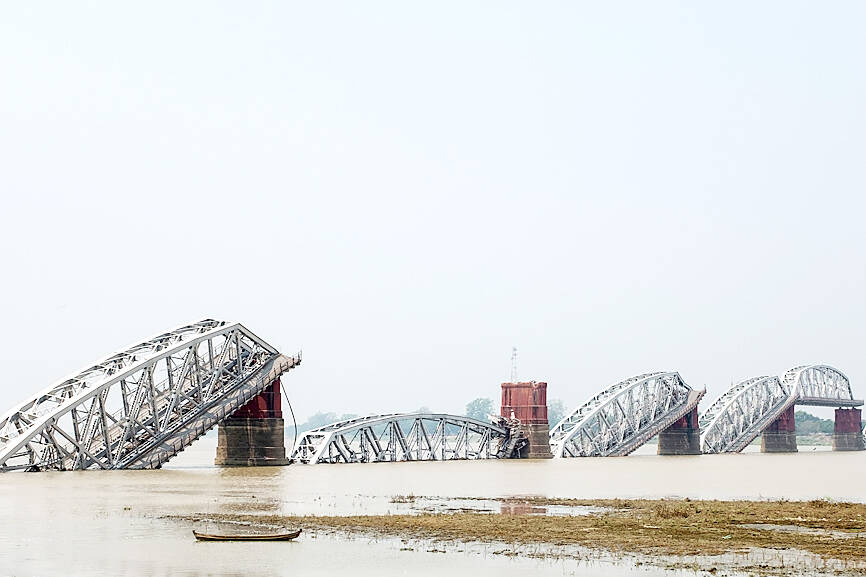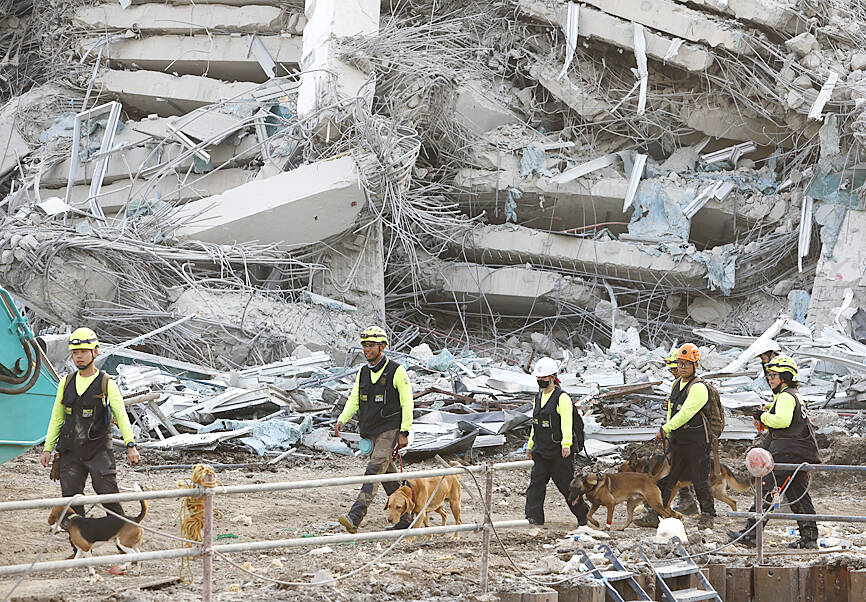The death toll from a huge earthquake that hit Myanmar and Thailand passed 1,000 yesterday, as rescuers dug through the rubble of collapsed buildings in a desperate search for survivors.
The shallow magnitude 7.7 quake struck northwest of the city of Sagaing in central Myanmar in the early afternoon, followed minutes later by a magnitude 6.7 aftershock.
The quake destroyed buildings, downed bridges and buckled roads across swathes of Myanmar, with massive destruction in Mandalay, the country’s second-biggest city and home to more than 1.7 million people.

Photo: AFP
“We need aid,” said Thar Aye, 68, a resident of Mandalay. “We don’t have enough of anything.”
At least 1,007 people were killed and about 2,400 were injured in Myanmar, with 30 more missing, the junta said in a statement.
About 10 more deaths had been confirmed in Bangkok.

Photo: EPA-EFE/STRINGER
However, with communications badly disrupted, the true scale of the disaster is only starting to emerge from the isolated military-ruled state, and the toll is expected to rise significantly.
More than 90 people could be trapped in the crushed remains of one apartment block in Mandalay, a Red Cross official said.
This was the biggest quake to hit Myanmar in decades, according to geologists, and the tremors were powerful enough to severely damage buildings across Bangkok, hundreds of kilometers away from the epicenter.

Photo: EPA-EFE
In Mandalay, Agence France-Presse journalists saw a centuries-old Buddhist pagoda that had been reduced to rubble.
“It started shaking, then it started getting serious,” a soldier at a checkpoint on the road outside the pagoda said. “The monastery also collapsed. One monk died, some people were injured, we pulled out some people and took them to the hospital.”
Guards at Mandalay Airport turned away journalists.
Damage to the airport would complicate relief efforts in a country whose rescue services and healthcare system have already been ravaged by four years of civil war sparked by a military coup in 2021.
Junta chief Min Aung Hlaing on Friday issued an exceptionally rare appeal for international aid, indicating the severity of the calamity.
Previous military governments have shunned foreign assistance, even after major natural disasters.
The country declared a state of emergency across the six worst-affected regions after the quake, and at one major hospital in the capital, Naypyidaw, medics were forced to treat the wounded in the open air.
Offers of foreign assistance began coming in, with US President Donald Trump on Friday pledging US help.
An initial flight from India carrying hygiene kits, blankets, food and other essentials landed in the commercial capital Yangon yesterday.
China said it sent an 82-person team of rescuers to Myanmar.
Aid agencies have warned that Myanmar is unprepared to deal with a disaster of this magnitude.
About 3.5 million people were displaced by the raging civil war, many at risk of hunger, even before the quake struck.
Across the border in Bangkok, rescuers worked through the night searching for survivors trapped when a 30-story skyscraper under construction collapsed, reduced in seconds to a pile of rubble and twisted metal by the force of the shaking.
Bangkok Governor Chadchart Sittipunt said that about 10 people had been confirmed killed across the city, most in the skyscraper collapse.

‘FORM OF PROTEST’: The German Institute Taipei said it was ‘shocked’ to see Nazi symbolism used in connection with political aims as it condemned the incident Sung Chien-liang (宋建樑), who led efforts to recall Democratic Progressive Party (DPP) Legislator Lee Kun-cheng (李坤城), was released on bail of NT$80,000 yesterday amid an outcry over a Nazi armband he wore to questioning the night before. Sung arrived at the New Taipei City District Prosecutors’ Office for questioning in a recall petition forgery case on Tuesday night wearing a red armband bearing a swastika, carrying a copy of Adolf Hitler’s Mein Kampf and giving a Nazi salute. Sung left the building at 1:15am without the armband and apparently covering the book with a coat. This is a serious international scandal and Chinese

PERSONAL DATA: The implicated KMT members allegedly compiled their petitions by copying names from party lists without the consent of the people concerned Judicial authorities searched six locations yesterday and questioned six people, including one elderly Chinese Nationalist Party (KMT) member and five KMT Youth League associates, about alleged signature forgery and fraud relating to their recall efforts against two Democratic Progressive Party (DPP) legislators. After launching a probe into alleged signature forgery and related fraud in the KMT’s recall effort, prosecutors received a number of complaints, including about one petition that had 1,748 signatures of voters whose family members said they had already passed away, and also voters who said they did not approve the use of their name, Taipei Deputy Chief Prosecutor

UNDER ATTACK: Raymond Greene said there were 412 billion malicious threats in the Asia-Pacific region in the first half of 2023, with 55 percent targeting Taiwan Taiwan not only faces military intimidation from China, but is also on the front line of global cybersecurity threats, and it is taking action to counter those attacks, President William Lai (賴清德) said yesterday. Speaking at the opening of this year’s Cybersec Expo in Taipei, the president assured foreign diplomats and exhibitors that Taiwan remained committed to strengthening its defense against cyberattacks and enhancing the resilience of its digital infrastructure. Lai referenced a report from the National Security Bureau (NSB) indicating that the Government Service Network faced an average of 2.4 million intrusion attempts daily last year, more than double the figure

COUNTERINTELLIGENCE TRAINING: The ministry said 87.5 percent of the apprehended Chinese agents were reported by service members they tried to lure into becoming spies Taiwanese organized crime, illegal money lenders, temples and civic groups are complicit in Beijing’s infiltration of the armed forces, the Ministry of National Defense (MND) said in a report yesterday. Retired service members who had been turned to Beijing’s cause mainly relied on those channels to infiltrate the Taiwanese military, according to the report to be submitted to lawmakers ahead of tomorrow’s hearing on Chinese espionage in the military. Chinese intelligence typically used blackmail, Internet-based communications, bribery or debts to loan sharks to leverage active service personnel to do its bidding, it said. China’s main goals are to collect intelligence, and develop a